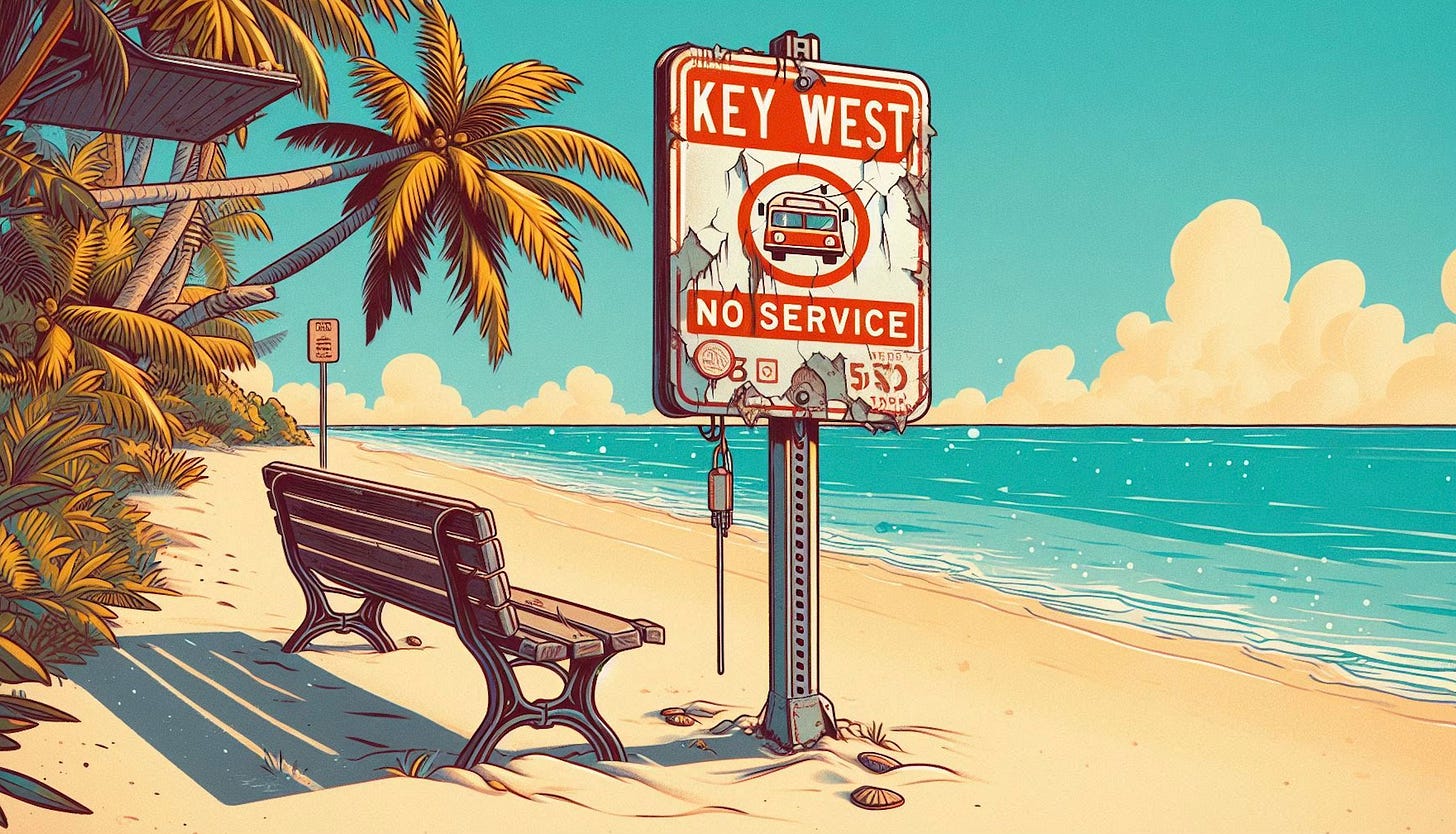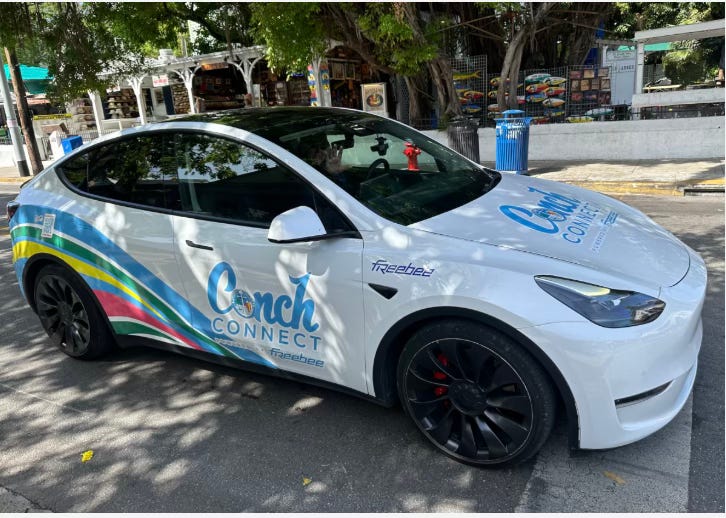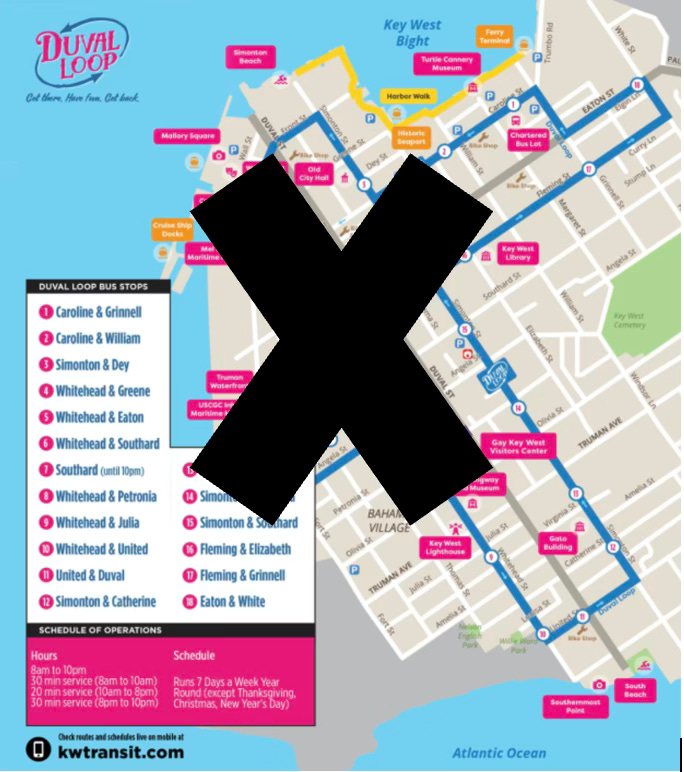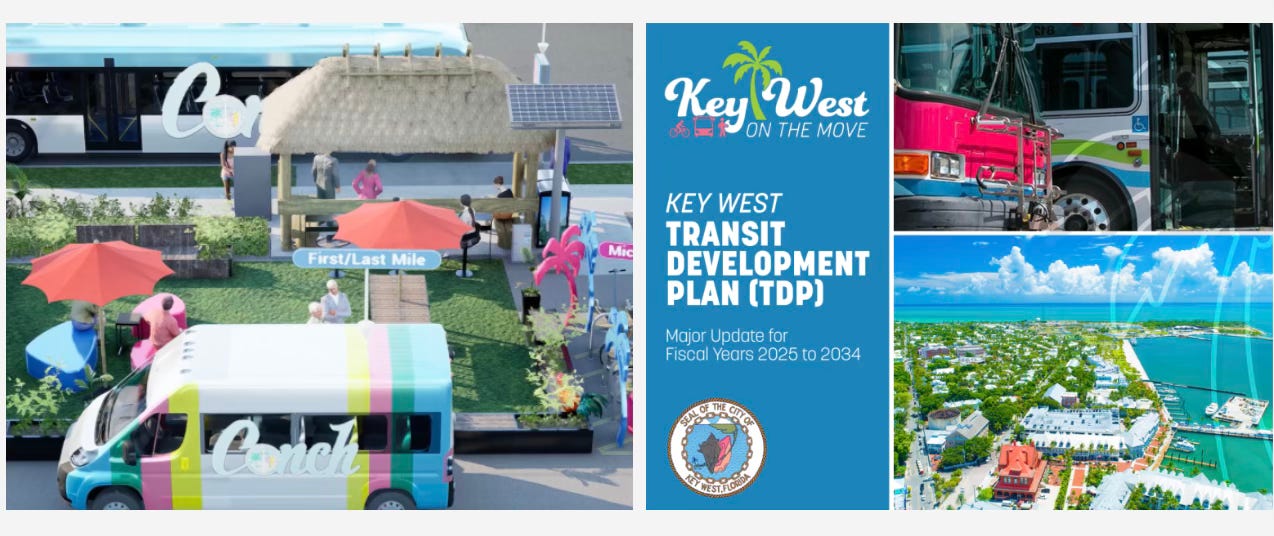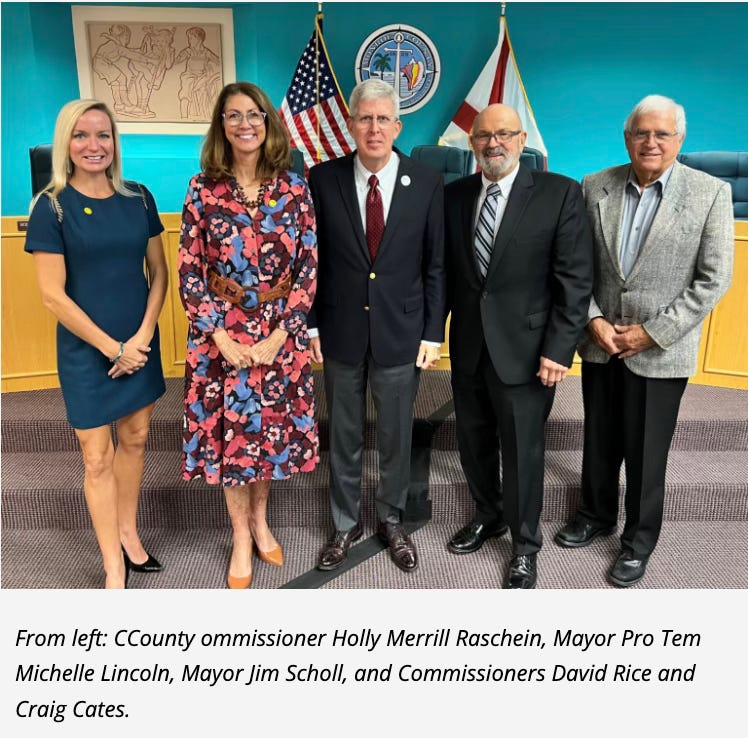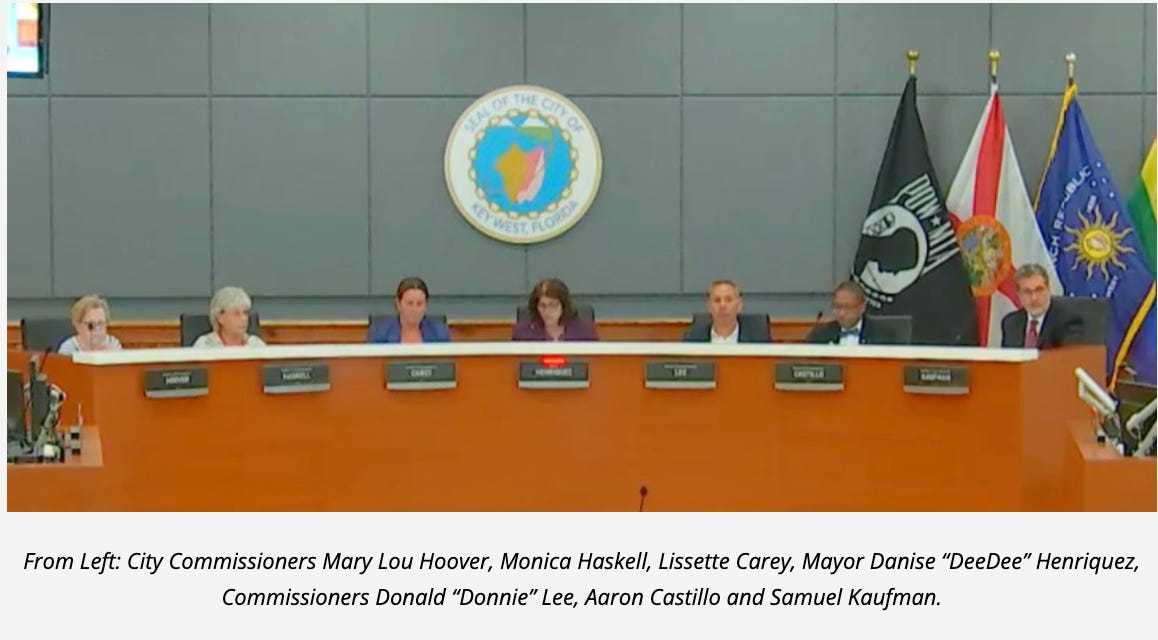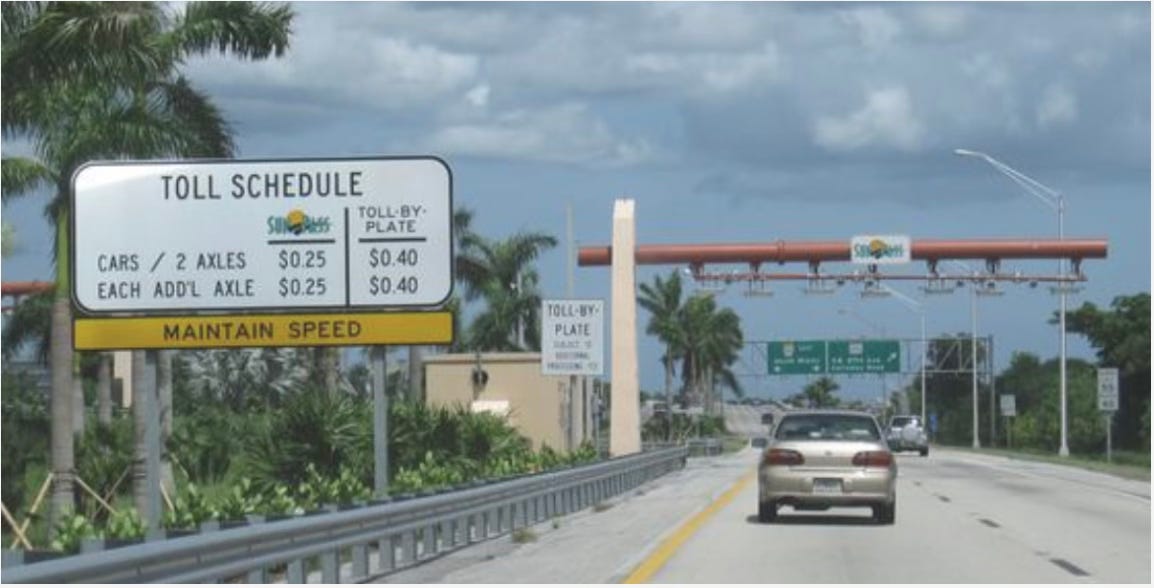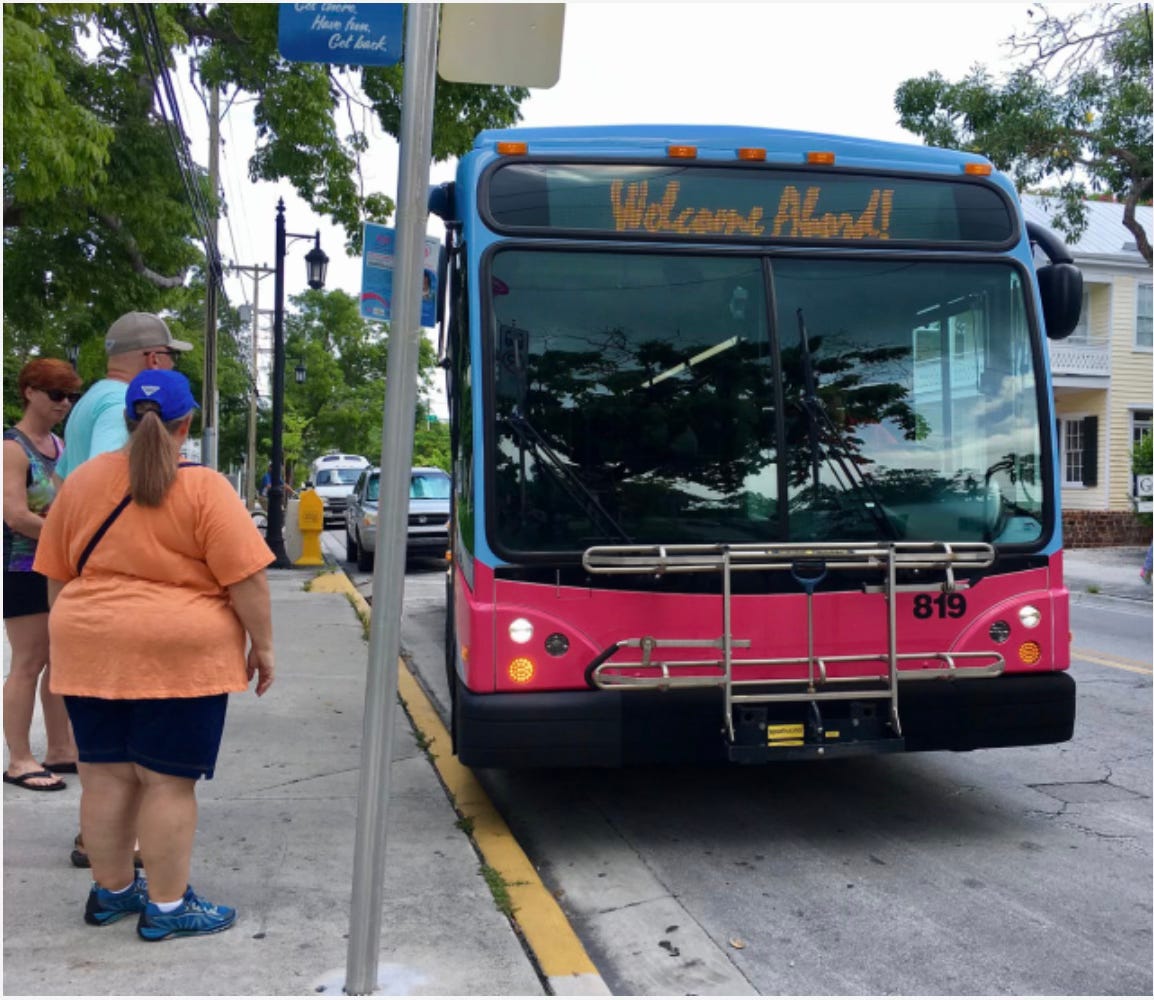Dumb and Dumber Transit Cuts: A Failure of Leadership in the Keys
The cuts keep coming—and Monroe County and the City of Key West are playing dumb as they actively dismantle the transit system that workers, businesses, and visitors rely on every single day.
Conch Connect is gone. Duval Loop and Key West Rides are next. Even part of the Workforce Express may be axed.
And now? The County wants to eliminate its entire Transit Department—along with its only staffer, Director Richard Clark, who’s spent nearly three years trying to build a regional system from scratch.
The result? Workers stranded. Downtown businesses losing foot traffic. Families facing ever higher rent and car payments without an alternative to get around. A community slipping further from its own stated goals.
These aren’t budget trims. They’re betrayals. Our leaders keep pointing fingers at Tallahassee and Washington—but they’ve had years to prepare. I mean how could they not have seen this coming? The warning signs from up north weren’t subtle. They were flashing red. Similar cuts have happened before. And still, they did nothing to get in front of the problem.
If you don’t own a car in the Keys, here’s the message: You don’t matter.
This article explores a regional transit system unraveling—not from lack of ideas, but from lack of courage. The vision exists. The need is urgent. What’s missing is the will to act—and the leadership to care.
Monroe County’s Retreat from Transit
Monroe County isn’t just trimming transit—it’s walking away from it. Its decision to eliminate the Transit Department means losing not only its sole employee, Transit Director Richard Clark—a seasoned public servant with deep expertise in resilient transit and a decade of experience navigating local, state, and federal policy—but also the last vestige of coordinated regional planning.
With Conch Connect ending, riders on Stock Island and Key West are stranded.
Freebee’s future in Islamorada is adrift—no funding path, no commitment.
If Miami-Dade’s 301/302 buses from Miami to the Upper Keys get cut back, what’s the County going to do?
The County’s exit leaves Key West Transit isolated and unsupported. Regional collaboration? Dead in the water.
This isn’t belt-tightening. It’s a retreat from public transit as a public responsibility—and a betrayal of anyone who depends on it.
The City’s Cuts Hurt Workers and Downtown Businesses
Key West’s proposed transit cuts aren’t just budget decisions—they’re blows to the backbone of the local economy.
The Duval Loop, once a symbol of car-free convenience and the pride of downtown, is now slated for elimination.
Key West Rides, which primarily serves workers and residents, is proposed to be drastically scaled back or totally eliminated.
The Workforce Express service on the County side of Stock Island is in the "might" category for cuts, leaving low-income workers who rely on transit to reach jobs in Old Town at risk. These are the same workers who power the tourism engine, clean hotel rooms, serve meals, and keep the city running.
Here's the thing about the City’s proposed cuts. Despite reductions in federal and state assistance they still have well north of $5M in projected revenues from all kinds of non-General Fund sources. What they need to do is find a source to absorb what they previously depended on from the current administrations in D.C. and Tallahassee. These cuts don’t just trim fat—they cut into the muscle of a city that claims to value its people and its future.
Why Transit Matters: A Lifeline for Workers, Businesses, and the Keys
In cities like Key West, public transit isn’t just a service—it’s a lifeline. Without it, our streets become congested, our neighborhoods fragmented, and our most vulnerable neighbors isolated.
TRANSIT IS ESSENTIAL FOR WORKERS. Many rely on it to reach jobs, schools, and healthcare. Cutting that lifeline isn’t thrift—it’s cruelty.
TRANSIT FUELS DOWNTOWN AND TOURISM. The Duval Loop offers car-free access to shops, restaurants, and attractions. A vibrant Old Town isn’t built on parking—it’s built on foot traffic stepping off buses.
TRANSIT HELPS EASE GRIDLOCK. The Overseas Highway is maxed out. Better service could relieve daily congestion and make life on our islands bearable again.
TRANSIT LOWERS HOUSEHOLD COSTS. A car-free or car-light lifestyle saves thousands a year on gas, insurance, and repairs—making island life more attainable for working families.
The City and County say they support workers, small businesses, and affordability—but their retreat from transit tells a different story.
Retreat from the Future
What’s being cut isn’t just transit—it’s a blueprint for a better future.
The City of Key West’s recently adopted 10-Year Transit Development Plan (TDP) proposed expanded and new service, longer hours, and upgraded infrastructure. Monroe County’s soon to be defunct Transit Department, under Director Richard Clark, had envisioned frequent 30-minutere service along the entire Overseas Highway, supported by local connectors and hubs in the neighborhoods. These plans offered frequent, more connected transit—built from community input and local realities.
But now?
The City’s proposed cuts openly contradict the TDP and the upgrades in existing and promises for new services it just approved.
The County’s transit retreat erases the visionary regional framework Clark worked to build.
This isn’t just a missed chance—it’s a conscious retreat from a future that was fully mapped out. The plans are there. The need is clear. What’s missing is the will to deliver.
🚫 Failure of Leadership: How We Got Here
This wasn’t an accident. It was a decision.
Transit in the Keys isn’t collapsing from lack of ideas—it’s being dismantled by leaders who refused to lead and get ahead of these recurring and predictable shortfalls.
The finance departments treat transit like a costly nuisance, not a vital service.
The electeds show no appetite to defend it—even when their own staff and constituents issue warnings.
There’s no reliable local funding. Just a patchwork of grants, fees, and wishful thinking.
Promising pilots like Conch Connect are scrapped before they can evolve.
The shift to Key West Rides On-Demand 2 years ago? More improvisation to similar budget shortfalls than innovation.
And the County’s attitude toward transit seems to reflect their disdain for people without cars, as on bikes they’re just as bad. Witness their rejection of one block of bike lane on Southard Street for car parking instead and ignoring the City’s bike plan in recommending bikes lanes on First and Bertha Streets for parking instead yet again—each one a case study in car-brain.
It’s not just dysfunction. It’s abandonment.
If you don’t own a car in the Keys, here’s the message: YOU DON’T MATTER.
And that’s a moral failure—one that’s deepening as housing costs skyrocket, the economy increasingly relies on service workers, and mobility shifts from a necessity to a privilege.
Still, not everyone’s given up. Just a few months into his new job, City Transit Director Rogelio Hernandez is scrambling for solutions. He told us:
“We have not given up. A committed group of leaders—including my team and I—are exploring every possible avenue to not only keep these vital services running for another year, but to identify a long-term, sustainable solution.”
His team’s dedication exposes what his bosses ‘leadership ought to look like—and what the rest of City Hall at the City and the County fails to deliver.
What Could Work In the Keys
The City and County’s financial neglect of transit is a symptom of a deeper problem: a lack of political will to prioritize public transportation as a community investment. Or we wouldn’t be here, right?
They say they support affordable housing. But they won’t fund the transit that makes it reachable or that allows them to lower life’s overall costs by going car-lite or car-free.
They say they support workers. But they won’t fund the transit that gets them to their jobs.
They say they support small businesses. But they won’t fund the transit that brings customers to their doors.
They say they support sustainability. But they won’t fund the transit that reduces car dependency.
They say they support tourism. But they won’t fund the transit that makes it easy for visitors to get around without clogging our streets and taking our resident’s and worker’s parking spaces with their cars.
If they truly meant what they say, they’d act. Here’s how they could start:
TURN TOURIST AND OR PARKING FEES NTO A LIFELINE. Visitors contribute significantly to the wear and tear on local infrastructure. A modest increase in tourist fees/taxes and/or directing more parking revenue could provide a dedicated revenue stream(s) for transit.
TAP THE TDC TREASURE CHEST. The Tourist Development Council (TDC) collects millions annually to promote tourism. Allocating a fraction of these funds to transit could help sustain services that benefit both visitors and residents.
BUILD BRIDGES, NOT SILOS. A unified regional transit authority could pool resources, streamline operations, and ensure consistent service across the Keys. This would require collaboration between the City, County, and neighboring municipalities.
LET VOTERS LEAD THE WAY. A ballot measure for local transit funding could secure dedicated revenue, similar to initiatives passed in other communities facing similar challenges.
BRING BACK THE TOLLS. Up until the late 1950s, the Overseas Highway had tolls. With modern tolling technology in Florida, toll booths are no longer necessary, avoiding traffic slowdowns. Strategic tolls along the highway could generate funds specifically earmarked for transit improvements.
These aren’t silver bullets, but they’re a start for discussion.
And we should note that most of the above suggestions are beyond the direct control of the two transit directors. What’s clear is that the current approach—relying on federal and state grants while neglecting local investment—isn’t sustainable, and it is going to take top management and commissioners to figure it out.
Will Our Leaders Abandon Transit—and the People Who Depend on It?
If you can’t afford a car in the Florida Keys, you’re being told—loud and clear—you don’t belong. That’s the message Monroe County and the City of Key West are sending as they gut transit and neglect bike infrastructure.
In one of the most expensive housing markets in the country, this isn’t just bad budgeting—it’s systemic exclusion. Affordable housing and accessible transit are inseparable. Without both, we become a playground for the wealthy, not a home for working families.
Public transportation is a civic promise. To abandon it is to betray that promise—and the people who need it most.
County Commissioner Michelle Lincoln told us this week about the Conch Connect cuts:
“We still need a smarter, more efficient way to connect people from their homes to our business districts. I remain hopeful that we can reintroduce a solution like Conch Connect in the future—one that truly serves its purpose and supports our shared vision for a more sustainable, less car-dependent Key West.”
WHY WAIT for the future? Here’s what the County should do this budget cycle. Keep the transit department AND redirect funds that would have gone to the Conch Connect to the Lower Keys Shuttle and Workforce Express to increase the awful 90-120 minutes waits between buses.
City Commissioner Sam Kaufman continues to step up. He questioned the cuts directly at the City budget meeting saying:
“We had this exact same funding discussion two years ago. That led to ending fixed-route services and switching to the cheaper on-demand Key West Rides. The City just adopted a 10-year Transit Development Plan—isn’t this going in the opposite direction? How are we to move forward? Our workers and low-income people use these services! Are you telling us there’s no other choice? What do we aim for? What do we do? How do we recover?”
Lincoln understands. Kaufman gets it and has the fire. But where are the rest?
Every commissioner should be making the same demand: find the money, defend the City and County plans, and build the system that’s already beautifully mapped out. Stop hiding behind grant shortfalls, pretending you didn’t know this might happen and start leading.
The 10-Year Transit Development Plan lays out the blueprint. The County Transit Director’s vision fills in the gaps. What’s missing isn’t direction—it’s backbone.
# # #
Tell Your Commissioners Transit Matters
Here’s the link to contact the Monroe County Commissioners, City of Key West Mayor, and the City of Key West Commissioners. To follow budget discussions here’s Monroe County’s Budget and Finance Departmentwhich has some FY26 Proposed Budget information. Here’s the City of Key West Finance Department but we can’t find any FY26 information yet.
Chris Hamilton is the founder of Friends of Car-Free Key West & Duval Street/Historic Downtown, a local advocacy group championing sustainable mobility and vibrant public spaces. Subscribe to the blog and follow on Facebook, Twitter, and Substack for updates. Originally from Washington, D.C., Chris spent over two decades leading nationally acclaimed initiatives in transit, biking, walking, and smart growth for Arlington County, VA’s DOT. Since moving to Key West in 2015, he has embraced a car-free lifestyle downtown, dedicating his time to non-profits and community projects. Explore all Streets for People column articles here.


